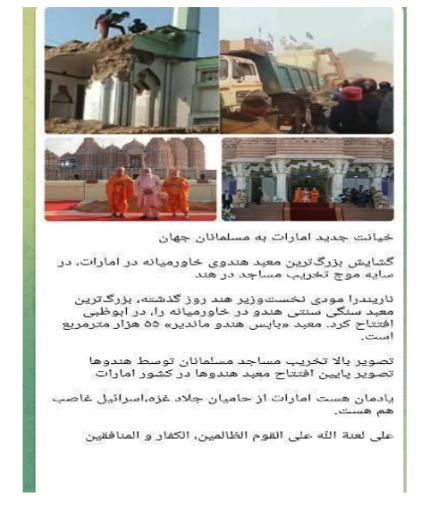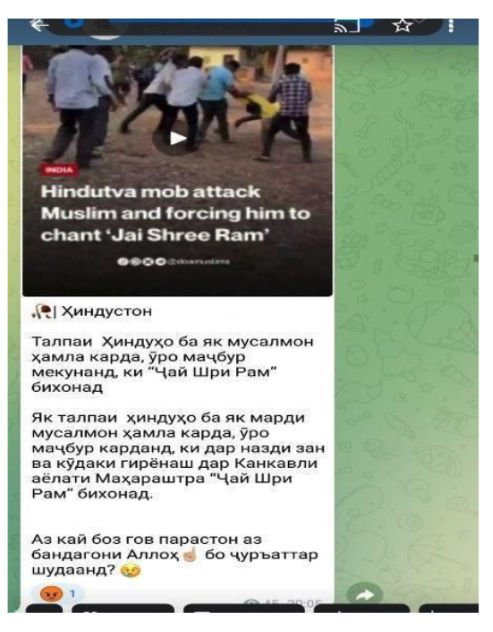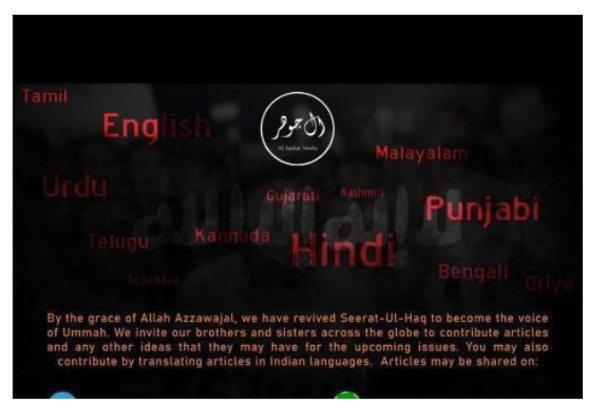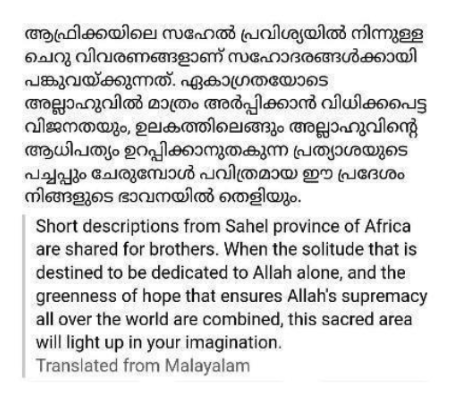Introduction
Islamic State in Al-Hind province (ISHP), IS’s branch in India, has been close to operationally dormant since mid-2022, with its media outreach significantly undermined following the discontinuation of the pro-ISHP online magazine Voice of Hind. In my previous Insight for GNET, I argued that the Islamic State in Khorasan province (ISKP), IS’s Afghan affiliate, stepped in to fill this void left by ISHP in the media and the operational realms. It is now spearheading the media warfare targeting India, emerging as IS’s most hostile anti-India branch. ISKP’s Al Azaim media foundation primarily uses Telegram, Rocket Chat, and archival websites to disseminate its propaganda, and its content is also being distributed across pro-IS multi-lingual translation platforms.
ISKP has been leading its anti-India cause, increasingly motivated by hostility stemming from alleged discrimination and rising violence against Muslims in India, as well as the country’s deepening engagement with its sworn enemy, the Taliban regime. ISKP’s role in the deadly Moscow City Hall attack, as pointed out by intelligence agencies, starkly underscored the group’s expanding transnational reach and external operational capabilities. The terror group has previously launched attacks in neighbouring countries, including Tajikistan, Uzbekistan and Iran, now eyeing targets in the West with equal fervour. To no exception, India, being in its immediate neighbourhood, also faces mounting regional security threats from ISKP operating in the Afghanistan-Pakistan region. This Insight sheds light on ISKP’s and pro-ISHP media entities’ recent propaganda campaign against India, particularly in light of the ongoing national elections in the country.
ISKP’s recent anti-India media discourse
Staying on its course to exploit the deep-seated communal rifts in India, ISKP’s Al-Azaim media released a slew of anti-India propaganda revolving around January’s inauguration of the Ram Temple in Ayodhya by Prime Minister Modi, where the Babri Masjid once stood before its demolition in 1992. Issue 30 of ISKP’s Pashto Voice of Khorasan magazine, accompanied by an anti-India propaganda video from Al-Azaim addressing this issue, accused Hindus of inflicting “serious harm” on the faith of Indian Muslims through the demolition of the Babri Masjid, contending that Modi’s Bhartiya Janta Party (BJP) expedited the building of the temple for political mileage.
ISKP also criticised Indian Muslims for not resisting the Supreme Court’s decision to grant disputed land to Hindus, threatening attacks on Hindus and their places of worship in India. ISKP’s media discourse has been preoccupied with expressing dissatisfaction with the Muslim populace in India for favouring legal avenues over violence to address their perceived grievances against the establishment. This criticism also extends to some Indian Islamic scholars for fostering interfaith harmony with the leaders from the Hindu nationalist movement, Rashtriya Swayamsevak Sangh (RSS). Similarly, ISKP has previously used the prophet controversy as cannon fodder for ramping up its anti-India media campaign.
In June 2022, less than a year after the Taliban’s return to power in Afghanistan, India quietly reopened its embassy in Kabul, stepping up its diplomatic engagement with Taliban leadership to discuss economic projects and coordinate the flow of humanitarian aid to the country. Since then, ISKP has aggressively censured the Taliban’s embrace of India, even threatening to attack the Indian embassy in Kabul. In its recent propaganda, ISKP argued that the Taliban are namesake Muslims, who in pursuit of power, are exploiting Islam to further India’s security interests, slamming the regime for “shamelessly protecting” Hindus and Sikhs in Afghanistan at India’s prompting in exchange for economic aid and international legitimacy. ISKP also argued that under the guise of fighting ISKP, “the nationalist Taliban militia” seeks to yield handsome economic aid and benefits from “their polytheist brothers in India.”
In a personal account from an ostensible Indian IS sympathiser, shared via Al Azaim, the author narrated his perceived bitter experiences of communal violence in the aftermath of the Babri Masjid demolition. The Indian IS propagandist further criticised India’s diplomatic outreach to the Taliban. Rebuking the March meeting between India’s top envoy JP Singh and the Taliban’s foreign minister, Amir Khan Muttaqi in Kabul, he argued that the Indian government is “using its Taliban puppets” to take down ISKP and asserting that their attempts at “jointly combating the group are futile.” He also condemned India’s recent diplomatic overtures toward the Taliban, citing invitations extended to top Taliban figure Badruddin Haqqani to India’s Republic Day celebrations at its embassy in UAE, censuring the Taliban for requesting military training for its troops in India.
ISKP’s propagandists have also been shaping narratives concerning regional dynamics involving India and its ties with its neighbours and other Gulf countries. Issue 32 of the English Voice of Khorasan magazine delved into a diplomatic row between India and the Maldives, accusing former Maldivian leaders, and the current President, Mohamed Muizzu, of being pawns in the hands of regional powers like China and India. Persian ISKP supporters have also rebuked Modi’s February visit to UAE to inaugurate the UAE’s largest Hindu temple, alleging the UAE “of betraying the trust of Indian Muslims, further scrutinising the strategic ties between the two countries. Ethnic Tajiks, who have formed the group’s most lethal fighters and leading propagandists, have also taken a newfound interest in amplifying the incidents of communal violence in India by widely circulating the video of an Indian police officer hitting Muslims during prayers in New Delhi. Similarly, Pro-ISKP Persian media group Al-Ikhlas, referencing the January visit of India’s Minority Affairs Minister Smriti Irani to Medina and the Quba Mosque, asserted that India is fostering strategic ties with Saudi Arabia and other Gulf states to “spread its idolatry and cultural influence by persuading them to establish temples” for India’s Hindu diaspora residing in the Gulf.

Figure 1. Persian ISKP supporter condemns PM Modi’s visit to UAE for inaugurating a Hindu temple also criticising UAE for advancing its ties with India.

Figure 2. Pro-ISKP Tajik channel comments on the communal tensions in India.
Pro-ISHP Al Jauhar media and Indian IS propagandists step up their anti-India rhetoric
After a hiatus of over a year, Pro-ISHP Al-Jauhar Media released the third issue of its English magazine Serat-ul- Haq in April 2024. In addition to covering the Ayodhya dispute echoing similar narratives as that of ISKP, the 15-page issue criticised the Taliban’s warming ties with India, China and the USA, along with celebrating the Moscow attack. With the ongoing general elections in India, a lengthy article argued that democratic governance has strengthened the influence of the right-wing leaders in Europe and India, suggesting that an anticipated BJP victory in the upcoming elections will allegedly further marginalise Indian Muslims. To expand its engagement with linguistically diverse Indian Muslims, Al Jauhar media exhorted contributors to translate articles featured in its Serat-Ul-Haq magazine in various Indian languages, replicating ISKP’s internationalised media strategy of disseminating propaganda across multiple languages. Following ISKP’s Al Azaim’ media example, Al- Jauhar media solicited crypto donations through untraceable privacy coins like Monero to fund their operations. Moreover, Pro-ISKP Tajik networks have also widely used alternative cryptocurrencies such as Tether, Ethereum and Bitcoin along with various digital payment apps like QIWI in their online crowdfunding campaigns for financing Tajik IS families held in the camps of northeastern Syria.

Figure 3. Pro-ISHP Serat-Ul-Haq magazine calls upon contributors to translate content into Indian languages.
ISKP has also strategically engaged with the Muslim populace in the Indian state of Kerala, known as fertile ground for IS in India. Through its Al-Azaim media foundation, ISKP disseminated a handbook in the local Malayalam language on ways to engage in jihad and also sought to embed itself into the local milieu by publishing several articles from Indian contributors in its online Voice of Khorasan(VOK) magazine. One of the articles defended the banned Islamist outfit in Kerala, Popular Front of India, inviting its members to join IS. Along similar lines, a pro-IS Malayalam channel recently discovered on Facebook disseminated news on IS branches in Africa, scouting Malayali-speaking propagandists and fighters for IS strongholds in Africa. The channel’s Malayali administrator urged Indian Muslims to abstain from voting in the upcoming elections, admonishing them for consuming the election coverage instead of strengthening their faith.

Figure 4. A pro-IS Malayalam channel is actively spreading propaganda for IS affiliates in Africa, while also seeking out to recruit new Indian propagandists and fighters.
IS-linked and inspired terror plots against India
The surge in anti-India propaganda corresponds with the rise in IS-linked terror plots in the country, some involving foreign handlers. India’s National Investigation Agency’s probe into the low-intensity blast at a Bengaluru cafe on March 1, 2024, revealed that two of the accused were allegedly in touch with a Middle East-based IS handler and were part of an influential local IS-inspired module wanting to establish a foothold in southern India. In a recent development, four alleged IS-linked operatives from Sri Lanka were detained in Ahmedabad, the capital of the Indian state of Gujarat, just a day before the city was set to host the qualifiers of a major international cricket tournament, the Indian Premier League (IPL), on 21 and 22 May. These arrests come at a time when ISKP has also issued recurrent threats against major sporting events in Europe, with the Islamic State in Pakistan also threatening attacks against the upcoming Men’s T20 Cricket World Cup, to be co-hosted by the West Indies and the United States. Previously thwarted terror schemes also uncovered the role of ISKP handlers in recruiting Indians, directing them to travel to Afghanistan to join the group’s ranks. ISKP’s India-focused recruitment campaign faced a serious blow after the death of a senior Kashmiri militant who led ISKP’s cell of Indian suicide bombers. ISKP also claimed responsibility for the botched 2022 IED Mangalore and Coimbatore blasts in Southern India, likely overstating its role in the attacks, reflecting its desperate attempts to expand its footprint in the country. Collaborating with foreign agencies, NIA has previously thwarted terror plots linked to foreign ISKP and IS members. This suggests a concerted effort by foreign IS operatives to radicalise and recruit local cells and sympathisers in India for conducting attacks within the country.
Conclusion
In conclusion, despite facing setbacks, ISKP remains steadfast in stoking violence and exploiting communal tensions in India through intensified propaganda and recruitment efforts. The plethora of Indian-centric pieces in the Voice of Khorasan magazine that deals in depth with the country’s internal affairs underlines the growing role of Indian propagandists within ISKP’s media ecosystem. This further underscores the potential for collaboration between Al Azaim and pro-IS media entities in India as they gradually prioritise the dissemination of IS-related content in diverse Indian regional languages.
In the aftermath of the Moscow attack, media accounts of the pro-ISKP supporters suffered a wave of mass deletions on Telegram, the group’s digital safe haven. However, the group and its supporters were quick to resurface on the encrypted app by creating new channels and bots. The administrators of the pro-ISKP group chats urged members to refrain from publicly sharing invitation links or sending them to unknown accounts for fear of infiltration by security agencies into their networks and subsequent de-platforming. The supporters have responded to this crackdown by experimenting with a new encrypted Swiss messaging app called Teleguard, suggesting that Telegram will remain at the core of their outreach efforts.
Thus, there is an urgent need for content moderation teams at Telegram, Facebook, X, and other social media platforms like Facebook and Tiktok where the IS supporters have a substantial presence, to collaborate with governments robustly, international agencies like Europol, counterterrorism experts, and data interpreters to identify and remove extremist content as well as accounts and channels affiliated with violent extremist organisations. Efforts should also be dedicated to taking down IS’s mass distribution networks like Fursan Al Tarjuma, which translates IS content into 17 different languages and the pro-IS multilingual archival website, I’lam Foundation.
In the operational space, despite the NIA’s robust counterterrorism efforts to crack down on the group, local IS modules backed by foreign handlers persist in their resolve to launch attacks on Indian soil. As India cautiously engages with the Taliban to safeguard its geopolitical interests and counter the terrorism threat, ISKP will increasingly pursue opportunities to attack Indian interests on its home turf, Afghanistan, and within India.
